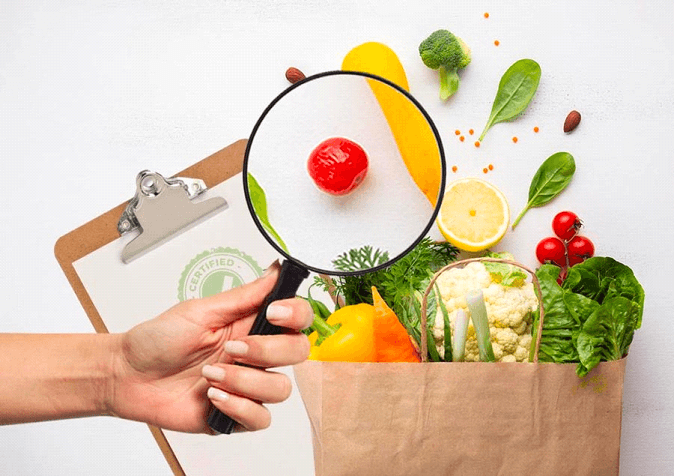Globalisation of the food industry has made it difficult to ensure food safety and quality assurance as global food supply chains are typically complex. This requires full traceability of all ingredients and methods of sourcing at each part of the supply chain. One solution is using blockchain technology which is technically a shared digital ledger of data stored redundantly in a network of nodes or systems. The four main principles in blockchain, which are provenance, consensus, immutability and finality principles. They make blockchain an ideal complementary solution to food safety and food quality management systems.
Blockchain can be implemented during the compliance process for supplier selection and assessment. It can also provide governance during the execution of smart contracts for financial and contractual compliance. Lastly, by leveraging on Internet-of-things (IoT) devices, blockchain can aid immensely in data collection along the food supply chain to deal with compliance issues.
Table of Contents
Food Regulatory Compliance
Blockchain is useful in food regulatory compliance as the “provenance” principle ensures that there is a maintenance of a complete audit trail which is critical in reducing food safety risks. There has been an alarming surge in number of high-profile food scandal cases in the past two decades such as the Melamine milk case in China (2008) and the horsemeat scandal in UK (2013) which have led to food poisoning and even deaths. This has naturally led to a tightening of both country-specific and international food safety and quality controls.

There are many internationally-used food safety standards, like Food Safety Modernisation Act (FSMA), Global Gap certification, Good Manufacturing Practices (GMP), Hazard Analysis Critical Control Point (HACCP) certification and Safe Quality Food (SQF) certification. Food regulatory compliance can be country-specific import and export requirements, internationally-recognised quality requirements or special quality requirements for specific products. Blockchain technology can be used to ensure compliance on such regulations by making food safe through accountability, traceability and transparency through the whole food supply chain. It requires importers and suppliers to conduct hazard analysis, check supplier’s credentials, control the lot, batch and pallet numbers and information. It can create an electronic record of ingredients, expiration dates and temperature controls during transit. Food compliance audits can also be made easier as frauds can be detected more easily due to the immutable nature of blockchain ledger records.
Blockchain Solution to Food Compliance
Currently the system of data collection and monitoring is manual, inefficient and siloed, making it time-consuming and costly to track backwards. In the event of a case of food fraud or terrorism, manual checking will typically require two to three weeks to find fault, triangulate the locations where defective products exist and have to be recalled. Therefore, blockchain technology can help in farm-to-fork traceability, aggregate and plug gaps in food supply chains. As recalls can cost up to millions of dollars and damage company reputations severely, blockchain technology can also increase food fraud savings and expedite recall processes.

Blockchain technology in the food supply chain started with two giants IBM and Walmart collaborating to enhance tracing capabilities within Walmart. Previously a manual traceback took seven days but this was drastically reduced to a mere few seconds using blockchain. From there onwards, IBM has set up the IBM Food Trust which has been the manual for many Enterprise Resource Planning (ERP) systems to integrate blockchain with their products, allowing companies to have more control over regulatory compliance and traceability.
Blockchain for Supplier Onboarding
There is also a need for due diligence for supplier selection and assessment where blockchain technology can be used. Many companies like Nestle use supplier procurement and management systems like Know Your Supplier (KYS) systems to verify the supplier’s credentials like financial and credit histories as well as fulfilling Anti-Money Laundering (AML) and Know Your Customer (KYYC) requirements. The supplier’s risk and compliance scores can be reviewed on the system. In such KYS systems in some companies, blockchain is being explored and used to reduce the verification processing times. Supplier information certificates can be verified through a shared ledger in an instant and all verified supplier data can be updated as and when required.
Smart Contracts for Food Compliance
Smart contracts are effectively agreements between two parties in the form of a computer code with a need for intermediaries like banks without compromising trust and authenticity. A smart contract allows an agreement to be automatically executed according to a set of predefined conditions. In fact, additional features like Quality of Services (QoS) and policy compliance can be enabled in smart contracts.
The full content is only visible to SIPMM members
Already a member? Please Login to continue reading.
References
Adrian Goh Boon Siong, GDSCM. (2018). “Blockchain Technology – The Next Revolution of Supply Chain”. Retrieved from SIPMM: https://publication.sipmm.edu.sg/blockchain-technology-next-revolution-supply-chain, accessed 08/06/2021.
Andrew Tan Howe, ADLSM. (2018). “Impact of Blockchain on Fast-Moving Consumer Goods”. Retrieved from SIPMM: https://publication.sipmm.edu.sg/impact-blockchain-fast-moving-consumer-goods/ , accessed 08/06/2021.
Fran Casino, et.al. (2019). “Modeling Food Supply Chain Traceability Based on Blockchain Technology”. Retrieved from https://www.sciencedirect.com/science/article/pii/S2405896319316088, accessed 05/06/2021.
Ginny Ng. (2019). “Sustainability Brief August 2019”. Retrieved from https://www.wilmar-international.com/docs/default-source/default-document-library/sustainability/sustainability-brief—satellite-monitoring.pdf?sfvrsn=ae655f17_2, accessed 05/06/2021.
Karin Wang, ADPSM. (2019). “Blockchain for Visibility in the Food Supply Chain”. Retrieved from SIPMM: https://publication.sipmm.edu.sg/blockchain-visibility-food-supply-chain/, accessed 08/06/2021.
Kay Behnke & Janssen. (2020). “Boundary Conditions for Traceability in Food Supply Chains Using Blockchain Technology”. Retrieved from https://www.sciencedirect.com/science/article/pii/S0268401219303536, accessed 05/06/2021.
Ravi Kanniganti. (2018). “Global Food Safety & FSMA Compliance Through Blockchain and IoT”. Retrieved from https://www.linkedin.com/pulse/global-food-safety-fsma-compliance-through-blockchain-ravi-kanniganti, accessed 05/06/2021.
Tomaz Levak, Ziga Drev, & Branimir Rakic. (2021). “Blockchain Technology Set to Revolutionize Food Safety in Supply Chains”. Retrieved from https://globalfoodsafetyresource.com/block-chain-technology-set-to-revolutionize-food-safety, accessed 05/06/2021.

